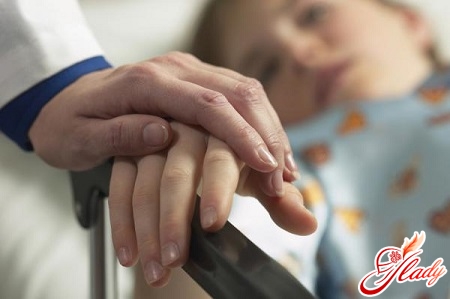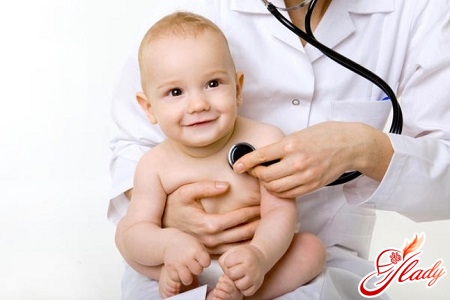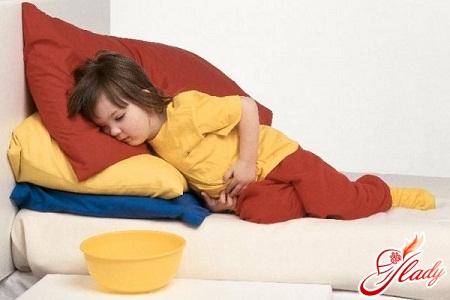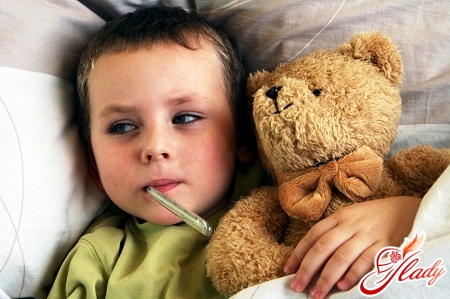 Antipyretic drugs for children are the following:a group of pharmacological drugs that are in the greatest demand in pharmacies. And this is not accidental - seeing an elevated temperature on the thermometer, most parents get scared and try to lower it with all their might. And they are right - if a child's body temperature rises, this is clear evidence that some kind of inflammatory process is taking place in the body. Or a viral infection has settled in it. In 80% of all cases, an increase in body temperature is a consequence of ARI or ARVI. And in other cases - symptoms of more serious diseases. And in this situation, an elevated body temperature is nothing more than a protective reaction of the body to pathological processes. Due to the increase in temperature, the reproduction of pathogenic microorganisms stops, and when the temperature rises above 38 degrees, most microbes die altogether. Simply put, if a child's illness occurs with an increase in body temperature, his immune system functions quite normally. And what do we, worried parents, do? That's right - before the mercury column has time to go over 37 degrees, they grab antipyretic drugs. Doctors recommend not to bring down the temperature until it is below 38.5 degrees. And before that, you can only monitor the baby's condition. First, make sure that the child gets enough fluids. The drink should be warm and not sour. Be sure to monitor the temperature in the room - the air should be moderately cool and in no case dry. You should also pay special attention to the child's clothing - do not wrap him up too much. The child's skin should be dry and slightly cool. If the baby starts to sweat, wipe him with a towel soaked in cool water - this will speed up the heat transfer process. However, all these measures are relevant only if the temperature is below 39 degrees. After this, it is necessary to take measures aimed at lowering the body temperature. However, there are a number of cases in which the temperature needs to be brought down earlier - at 38 degrees:
Antipyretic drugs for children are the following:a group of pharmacological drugs that are in the greatest demand in pharmacies. And this is not accidental - seeing an elevated temperature on the thermometer, most parents get scared and try to lower it with all their might. And they are right - if a child's body temperature rises, this is clear evidence that some kind of inflammatory process is taking place in the body. Or a viral infection has settled in it. In 80% of all cases, an increase in body temperature is a consequence of ARI or ARVI. And in other cases - symptoms of more serious diseases. And in this situation, an elevated body temperature is nothing more than a protective reaction of the body to pathological processes. Due to the increase in temperature, the reproduction of pathogenic microorganisms stops, and when the temperature rises above 38 degrees, most microbes die altogether. Simply put, if a child's illness occurs with an increase in body temperature, his immune system functions quite normally. And what do we, worried parents, do? That's right - before the mercury column has time to go over 37 degrees, they grab antipyretic drugs. Doctors recommend not to bring down the temperature until it is below 38.5 degrees. And before that, you can only monitor the baby's condition. First, make sure that the child gets enough fluids. The drink should be warm and not sour. Be sure to monitor the temperature in the room - the air should be moderately cool and in no case dry. You should also pay special attention to the child's clothing - do not wrap him up too much. The child's skin should be dry and slightly cool. If the baby starts to sweat, wipe him with a towel soaked in cool water - this will speed up the heat transfer process. However, all these measures are relevant only if the temperature is below 39 degrees. After this, it is necessary to take measures aimed at lowering the body temperature. However, there are a number of cases in which the temperature needs to be brought down earlier - at 38 degrees:
- Severe diseases of the cardiovascular system
- Diseases of the nervous system
- In the event that the child had previously had subfebrile convulsions
- Age of child under 3 months
- Significant deterioration of the child's well-being
However, doctors strongly advise against knocking it downtemperature on your own, but immediately call a doctor at home. Normally, all antipyretic therapy should be carried out only as prescribed by a pediatrician and under his strict supervision. After all, even the most harmless antipyretic drugs can lead to very serious complications. For example, numerous studies have shown that those children who systematically took aspirin before the age of 3 are much more at risk of developing bronchial asthma by the age of 6. That is why you should carefully approach the issue of choosing antipyretic drugs and do not use them without special need. And we will help you cope with this difficult task. Although, of course, it would be much better to consult a doctor - a pediatrician.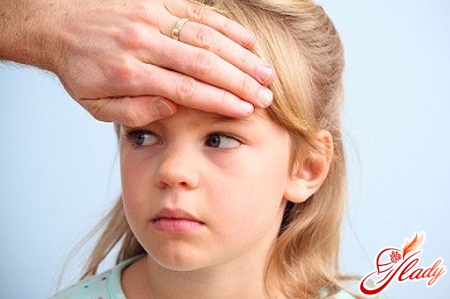
Choose a medicine
Unfortunately, there is not a single pharmacologicalantipyretic drug that would be absolutely harmless to children's health. All of them pose a potential threat to the child's health, as they can lead to the development of various complications. However, different antipyretic drugs have different levels of danger. Today, the most harmless antipyretic drugs for a child's health contain paracetamol. A single dose of such a drug can reduce the child's temperature for several hours. However, at high temperatures, unfortunately, the effect of drugs is very short-lived. Paracetamol is available in various forms - effervescent powders, tablets, syrups and rectal suppositories. In our pharmacies, the most popular antipyretic drugs for children are "calpol", "panadol", "efferalgan". When choosing, you need to focus on the form of release of the drug. The next most popular and safe antipyretic drug is Ibuprofen. It is sold under the names "ibufen" and "nurofen". This drug reduces the temperature more effectively and quickly than paracetamol. However, unfortunately, ibuprofen has many more side effects than paracetamol. Please note that doctors strongly advise against giving this drug to children under 12 months. Once again, I would like to advise paying special attention to the form of the drug - it is easier to give liquid medicines to babies in the form of syrup, and it is absorbed in this form much more effectively. And for very young children, it is better to give preference to rectal suppositories - they are much more convenient.
How correctly to knock down temperature?
It's time to talk about how to do it rightuse certain antipyretic drugs. As mentioned above, all medications can lead to the development of certain side effects. Therefore, always follow a few simple safety rules:
- Instructions for use
Always read the instructions carefully.use of a pharmacological drug. And do this even if you are giving this drug to your child more than once. And be sure to save the instructions - they may be needed at any time.
- Intended use
Remember that paracetamol can be usedonly as an antipyretic. Despite the fact that paracetamol is widely positioned as a painkiller, doctors strongly advise against using it for anything other than reducing fever. And then only if the child's body temperature exceeds 39 degrees.
- Age of child
Please remember that it is not permissible to give paracetamol to children under three months of age without first consulting a pediatrician.
- Dosage of the medicine
Strictly adhere to the age-appropriate dosage.Do not exceed it under any circumstances and do not give the child another dose just for prevention. Systematic use of antipyretic drugs increases the risk of complications several times.
- Compatibility of drugs
Don't forget what you shouldn't give to your childany antipyretic drugs if he is taking antibacterial drugs. This is possible only on the doctor's prescription and under his strict supervision. After you have given your child an antipyretic drug, carefully observe his condition for the next hour. If you notice that the child's cheeks have suddenly turned red, and his arms and legs have become cold, immediately call an ambulance. Before they arrive, thoroughly rub the skin of the child's arms and legs, give him warm tea to drink. And pay attention to another very important point - never give your child antipyretics if he has a stomach ache. In this case, it is possible to miss the onset of such a serious disease as appendicitis. It is much wiser to show the child to a doctor as soon as possible.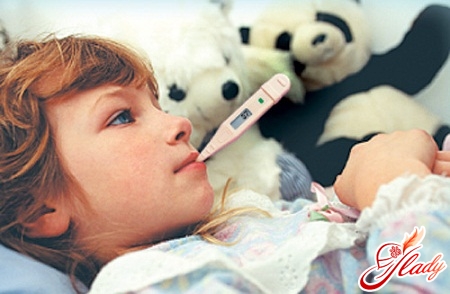
What antipyretic drugs can not be given?
In principle, the answer to this question follows fromall the above information. All those antipyretic drugs that do not contain ibuprofen and paracetamol are not suitable for reducing a child's temperature. Remember the following drugs and never give them to your child:
- Amidopyrine
- Acetylsalicylic acid
- Fenacetrine
- Antipyrine
- Analgin
All these drugs can lead to suchcomplications, such as the development of ulcerative lesions of the gastric mucosa, gastric and intestinal bleeding, acute renal failure. For example, the use of acetylsalicylic acid in children can provoke the development of Reye's syndrome - severe renal failure, in which a fatal outcome is observed in 50% of all cases. Analgin very often causes serious disruptions in the normal functioning of the hematopoietic system. In addition, there is a very high probability of body temperature dropping below 35 degrees. And this condition is also very dangerous both for the child's health and for his life. Therefore, you should not risk the health of your child. It is much safer to call a doctor who will select an effective antipyretic for children that will not harm the health of the baby.





